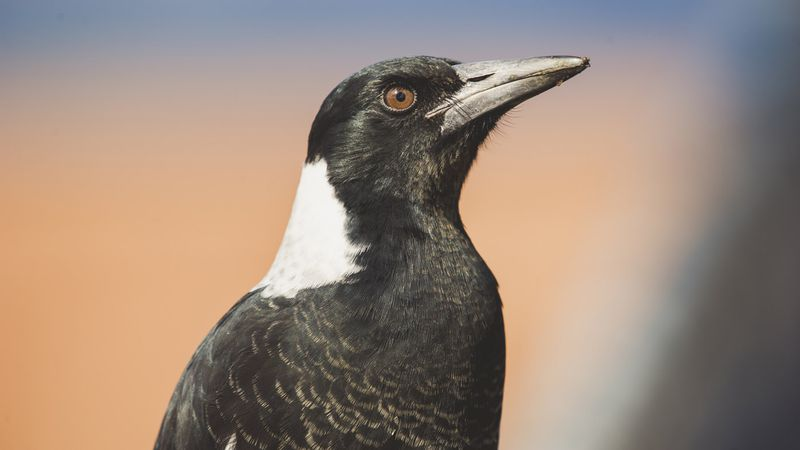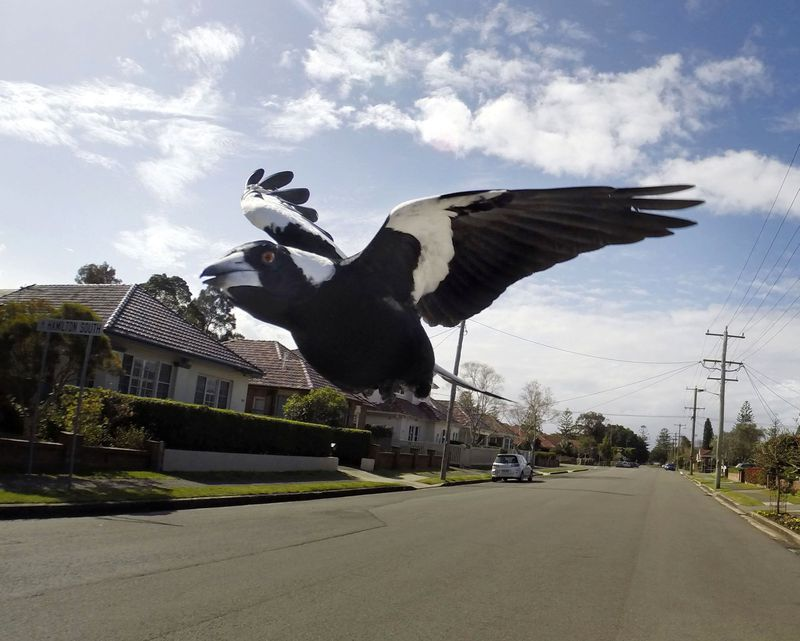Spring is here and so are magpies: Here’s how to avoid being attacked
By
- Replies 7
Happy spring, everyone! This is the time of year when the weather starts to warm up, the flowers start to bloom, and the days start to get longer. It's the perfect season for relaxing and enjoying the outdoors.
There's something about spring that just makes you feel good. The fresh air and the warmer temperatures are invigorating, and the longer days give you more time to enjoy the things you love. Whether you like to take walks in the park, sit in the sun, or just spend time with friends and family, spring is the perfect time to do it.
Of course, we Australians know that spring is also the time when our wildlife starts to become more lively.
The warmer weather means that snakes and other animals are out and about, so it's important to be careful when you're walking in the bush. And of course, the infamous magpies are also out and about, looking for a chance to swoop.
Okay, while we're very much familiar with stories of how these birds attack people, swoopers are relatively uncommon, which is a bit of a consolation for neighbourhoods that have a territorial magpie on their street.
According to the Australian Academy of Science, only one out of every twenty male magpies will swoop to protect their nesting partners. In fact, eight out of ten humans who are in a magpie area will never experience a swoop.
Furthermore, attacks that intend to do harm are significantly less frequent than swoops that just mean to scare people away from the area.
However, we should still be vigilant as magpies that swoop can inflict terrible harm, including damage to the eyes.

The warmer weather means that the infamous magpies are also out and about. Credit: 9News via Jamila Toderas.
If you're worried about getting attacked by these birds, there are measures to lessen this danger.
The Academy advises, seemingly against logic, that getting nearer to magpies may be beneficial. Especially making friends with them.
Magpies are intelligent birds that can recall faces, just like their cousin the crow.
Magpies will frequently quickly figure out you don't pose a threat if you remain consistently calm and don't react to swooping with anything that can be construed as a threat, such as waving your arms, a stick, or an umbrella.
The Academy also suggested 'not moving too quickly' when getting away from a magpie nest as they may view this as a threat. Instead, calmly walk away if ever you encounter a nest.
Speaking of slow-paced movements, cyclists may have a hard time dealing with magpies as they can perceive fast-moving, large objects (such as bikes) as predators, which could prompt them to become defensive.
If you're a cyclist and you don't want to walk your bike across the swooper's domain, the Academy recommended stocking up on some googly eyes to intimidate the birds away.
The South Australian Department of the Environment also noted, as an additional word of caution, that magpies can recall you as a threat for up to five years.
According to Lawrence Orel of the National Parks and Wildlife Service, magpies that swooped often were provoked in the past seasons.

Magpie attacks that intend to do harm are significantly less frequent than swoops that just aim to scare people. Credit: 9News/Darren Pateman.
The department also advised that the simplest method to prevent being swooped is to alter your course of travel because magpies will only defend their territory up to 50 metres from the nest.
Other simple precautions include carrying an open umbrella and donning a hat with a wide brim as well as sunglasses.
It is also recommended to travel in groups because magpies prefer to pounce on lone travellers.
It's crucial to keep in mind that the magpies' are just responding instinctively, said Mr Orel, who, with the help of the tools on the Parks and Wildlife website, asked parents to make sure their kids were 'magpie aware'.
He also noted that magpies typically swoop for about six weeks throughout the incubation period and the early stages of raising the chicks.
And while that seems like a long time to wait until you can relax in your garden, there will still be plenty of sunshine available after it ends, which is typically around the beginning of November.
If you do come across an aggressive magpie, be sure to mark the location because they like to return to the same nesting sites each year.
You can also check out Magpie Alert to see reported sightings..
We share the world with a variety of different wildlife, some of which can be dangerous to us if we're not careful. It's important to remember that we're not the only ones living in this world and that we need to be respectful of the other creatures that share it with us.
Have you been attacked by a magpie before? Better yet, do you know other tips for protecting yourself against magpies? Share them with us in the comments below!
There's something about spring that just makes you feel good. The fresh air and the warmer temperatures are invigorating, and the longer days give you more time to enjoy the things you love. Whether you like to take walks in the park, sit in the sun, or just spend time with friends and family, spring is the perfect time to do it.
Of course, we Australians know that spring is also the time when our wildlife starts to become more lively.
The warmer weather means that snakes and other animals are out and about, so it's important to be careful when you're walking in the bush. And of course, the infamous magpies are also out and about, looking for a chance to swoop.
Okay, while we're very much familiar with stories of how these birds attack people, swoopers are relatively uncommon, which is a bit of a consolation for neighbourhoods that have a territorial magpie on their street.
According to the Australian Academy of Science, only one out of every twenty male magpies will swoop to protect their nesting partners. In fact, eight out of ten humans who are in a magpie area will never experience a swoop.
Furthermore, attacks that intend to do harm are significantly less frequent than swoops that just mean to scare people away from the area.
However, we should still be vigilant as magpies that swoop can inflict terrible harm, including damage to the eyes.
The warmer weather means that the infamous magpies are also out and about. Credit: 9News via Jamila Toderas.
If you're worried about getting attacked by these birds, there are measures to lessen this danger.
The Academy advises, seemingly against logic, that getting nearer to magpies may be beneficial. Especially making friends with them.
Magpies are intelligent birds that can recall faces, just like their cousin the crow.
Magpies will frequently quickly figure out you don't pose a threat if you remain consistently calm and don't react to swooping with anything that can be construed as a threat, such as waving your arms, a stick, or an umbrella.
The Academy also suggested 'not moving too quickly' when getting away from a magpie nest as they may view this as a threat. Instead, calmly walk away if ever you encounter a nest.
Speaking of slow-paced movements, cyclists may have a hard time dealing with magpies as they can perceive fast-moving, large objects (such as bikes) as predators, which could prompt them to become defensive.
If you're a cyclist and you don't want to walk your bike across the swooper's domain, the Academy recommended stocking up on some googly eyes to intimidate the birds away.
The South Australian Department of the Environment also noted, as an additional word of caution, that magpies can recall you as a threat for up to five years.
According to Lawrence Orel of the National Parks and Wildlife Service, magpies that swooped often were provoked in the past seasons.
Magpie attacks that intend to do harm are significantly less frequent than swoops that just aim to scare people. Credit: 9News/Darren Pateman.
The department also advised that the simplest method to prevent being swooped is to alter your course of travel because magpies will only defend their territory up to 50 metres from the nest.
Other simple precautions include carrying an open umbrella and donning a hat with a wide brim as well as sunglasses.
It is also recommended to travel in groups because magpies prefer to pounce on lone travellers.
It's crucial to keep in mind that the magpies' are just responding instinctively, said Mr Orel, who, with the help of the tools on the Parks and Wildlife website, asked parents to make sure their kids were 'magpie aware'.
He also noted that magpies typically swoop for about six weeks throughout the incubation period and the early stages of raising the chicks.
And while that seems like a long time to wait until you can relax in your garden, there will still be plenty of sunshine available after it ends, which is typically around the beginning of November.
If you do come across an aggressive magpie, be sure to mark the location because they like to return to the same nesting sites each year.
You can also check out Magpie Alert to see reported sightings..
We share the world with a variety of different wildlife, some of which can be dangerous to us if we're not careful. It's important to remember that we're not the only ones living in this world and that we need to be respectful of the other creatures that share it with us.
Have you been attacked by a magpie before? Better yet, do you know other tips for protecting yourself against magpies? Share them with us in the comments below!







